I’ve been emphasizing lately that growing indications are that Trumpian rhetoric is very much a political tool. I know—you’re all saying, ‘Mark, like, duhhhh!’ But what I’m talking about here is the way Trump uses threats and bluster, or talks about ‘beautiful’ possible real estate deals. I’m talking about the meaning of words—basic words—that are prone to slip past us when Trump uses them. A prime example is the word ‘peace.’ We all think we have an adequate understanding of what this word means, and Trump certainly uses it a lot. He even says he wants to go down in history as the ‘peace president.’ But it’s clear that Trump is not using that word in the conventional sense, although he wants his use of the word to be understood in that conventional sense that we all think we ‘get’.
The best way I can think of to present this is to say that Trump is not actually interested in ‘peace’ per se—he’s interested in ‘peace deals’. When faced with peer or near peer foreign powers Trump will eschew direct military confrontation—Russia, China, and Iran are examples that come immediately to mind. That can be a close run thing, as the NYT recently revealed: Trump had to be talked back off the window ledge by Tulsi, Veep Vance, and Tat Man Hegseth, before he plunged us into greatly expanding his catastrophic Middle East war. With lesser powers Trump exhibits no visible compunction about waging war, and no empathy even for civilians. Think: Gaza, Palestine generally, Syria, Yemen, Lebanon.
Thus, the idea that Trump is actually interested in peace—as most of us understand the word—with Russia is, or should be, a priori suspect. From the beginning of Trump’s presidential career he has been clear that his interest in peace—or, a ‘deal’ or a ‘peace deal’—is all about clearing the geopolitical decks for the big project of neutering China, as the necessary step to MAGA. That is emphatically not ‘peace’ in the ordinary sense of the word. Further, we should not assume anything has changed. Indeed, during the 2024 campaign Trump explicitly stated, repeatedly, that his ‘peace deal’ with Russia would consist of setting a short deadline, knocking Russo-Ukrainian heads together, and telling them what peace deal was acceptable to him, to Trump. Failing that, Trump has said, he would escalate against Russia like they’ve never imagined—or something like that. This explains why he keeps a knucklehead like Keith Kellogg on his team. It’s not just to keep Kellogg from wandering the streets aimlessly, as might otherwise happen. It’s because Trump actually buys into most of the Anglo-Zionist ideas—with a few twists, like deal making in place of war if war looks too costly.
Today we get confirmation of all this. First, Russia. Russia, of course, has every reason to be distrustful of Trump, but to play him along. They’ve listened to his statements, they’ve taken note of who his advisers are, they recall Trump’s role in arming Ukraine to the teeth and provoking the war. They know that Trump’s unacceptable ‘peace deal’ proposals—various ceasefires, rather than dealing with the root causes of Russo-Western conflict—are driven by ulterior motives that are focused on China, and are dictated by the losing hand that Trump has inherited. But Trump is obsessed with his Grand Vision of reshaping the world in his own image and likeness—MAGA—and so he plunges on with threats, in a world in turmoil already:
Rubio told Lavrov that the US could abandon a peace deal on Ukraine if there are no clear signs that it can be achieved.
IOW, here we have confirmation that it’s not actually ‘peace’ that Trump is after, it’s a ‘peace deal.’ If that doesn’t look possible, Trump will move on. Who thinks that means he’ll simply pull out? He could have done that on day one, and achieved peace. I fear worse to come, although at the rate Trump is expending munitions and running down equipment in the Yemen region …
Anyway, the same dynamic is playing out in the Levant, in Syria. Who thinks installing a jihadi as ruler of the former Syria was intended to bring ‘peace’ in any ordinary sense of the word? This guy is an actual terrorist who had an American price on his head. This is peace in the Israeli sense of the word—chaos everywhere outside Israel’s to-be-defined-later borders. Peace in TrumpSpeak or IsraelSpeak emphatically does not exclude ethnic cleansing or even genocide. And so:
NEW: The Trump administration has ordered its new puppet in Syria to start expelling Palestinians - WSJ reports
The Trump administration threatens to take a hard line with Syria’s new government, demanding crackdowns on extremists and expelling Palestinian militants in exchange for a limited easing of sanctions.
Now, who do you think will define “extremists” and “militants.” Hint: Who says ‘everyone in Gaza is Hamas,’ or ‘there are no civilians in Gaza’? This is ethnic cleansing, pure and simple.
And the Trump Tariff policy—as part of his broader trade policy—fits into this picture. MoA has a must read analysis of the ‘economic’ thinking behind the Trump regime. As a reminder, I wrote this only yesterday:
However, what I find most disturbing in the tariff mess is the suspicion—voiced in this morning’s post—that behind the talk of reshoring our manufacturing base the real goal is to maintain the US as the hegemonic world superpower.
… the openly expressed views of Trump’s closest trade advisers. They want to tie trade policy into national security policy, keep the USD as the world reserve currency, and maintain the US as the single dominant hegemonic superpower—MAGA, ya’ll! IOW, the Trump Tariffs represent a way to strongarm the rest of the world into paying down the unsustainable US debt—and, maybe, reshore industries that are vital to the military. It’s a continuation of Neocolonialism. ... In the meantime, what does MAGA really mean for the rest of us? Brian Berletic describes Trump’s MAGA plans here:
Worst Case Scenario: Trump’s Tariffs Walling US Off Ahead of Wider World Conflict
In other words, Trump may not have been totally above board in selling his program to the electorate. Trump sold the tariffs as a way to throw a lifeline to the American working and middle classes, but the tariffs may actually tie into his foreign policy much more directly. Which raises the additional question, especially as posed by Brian Berletic, as to exactly what Trump’s foreign policy vision and goals are.
Compare that with this from MoA:
An Economic Advisor's Weird Theory
Steve Miran is the Chairman of President Trump's Council of Economic Advisors.
CEA Chairman Steve Miran Hudson Institute Event Remarks - The White House, Apr 7 2025
Today I’d like to discuss the United States’ provision of what economists call “global public goods,” for the entire world. First, the United States provides a security umbrella which has created the greatest era of peace mankind has ever known. Second, the U.S. provides the dollar and Treasury securities, reserve assets which make possible the global trading and financial system which has supported the greatest era of prosperity mankind has ever known.
...
Let me clarify that by “reserve currency,” I mean all the international functions of the dollar—private savings and trade included. I’ve often used the example that when private agents in two separate foreign countries trade with each other, it’s typically denominated in dollars because of America’s status as the reserve provider. That trade entails savings housed in dollar securities, often Treasurys. As a result of all this, Americans have been paying for peace and prosperity not just for themselves, but for non-Americans too.
There’s that word again: ‘peace’. Only Americans could swallow the idea that the world—awash in refugees—is at peace. Or that our global sanctions regime is intended to ensure prosperity for all, rather than to enforce a draconian neo-colonial worldwide regime.
...
I’m an economist and not a military strategist, so I’ll dwell more on trade than on defense, but the two are deeply connected. To see how it works, imagine two foreign nations, say China and Brazil, trading with each other. Neither country has a currency that is trusted, liquid, and convertible, which makes trading with each other challenging. However, because they can transact in U.S. dollars backed by U.S. Treasuries, they are able to trade freely with each other and prosper. Such trade can only occur because of U.S. military might ensuring our financial stability and the credibility of our borrowing. Our military and financial dominance cannot be taken for granted; and the Trump Administration is determined to preserve them.From an economic standpoint the theory Miran describes is bonkers. "Savings housed in dollar securities, often Treasurys" are not U.S. savings as he implies. They are money the U.S. has borrowed, i.e. the savings of foreigners.
His example of the U.S. dollar enabling trade between Brazil and China is just as wrong as his treasuries theory:
Brazil, China ditch US dollar for trade payments, favour yuan - News.au, Mar 31 2023
Brazil has just cut a deal with China to ditch the US dollar when paying each other for trade goods. It’s the latest victory in Beijing’s long-term drive to stomp on the greenback and establish the yuan as the dominant international currency.
The deal, announced Thursday, has revived concerns about the US dollar’s future.
Brazil and China will directly exchange payments without first converting their currencies to a trusted third-party economy.
That’s the traditional role of the greenback.
These ain't just small numbers:
According to Chinese customs statistics, the bilateral trade volume between China and Brazil in 2023 was US$181.53 billion, a year-on-year increase of 6.1 percent. Of this, China’s exports to Brazil amounted to US$59.11 billion, a year-on-year decrease of 4.3 percent, while imports from Brazil totaled US$122.42 billion, a year-on-year increase of 11.9 percent.
Brazil is not alone in doing this. Several other big countries, Russia, Saudi Arabia, Iran etc., have dropped U.S. Dollar intermediation in trade with China.
The Trump administration is aware of the problem:
Elon Musk @elonmusk - 22:51 UTC · Mar 29, 2023
Serious issue. US policy has been too heavy-handed, making countries want to ditch the dollar.
Combined with excess government spending, which forces other countries to absorb a significant part of our inflation
Elon Musk, speaking truth to power. Prosperity = you eat our dollars. Or else. That would be heavy handed—call it a protection racket, if you wish, although Miran prefers to call it “paying for peace and prosperity” and claims that Americans are the ones paying for it.
Since we see that trade in TrumpWorld is simply war by other means, we need to think about where America and the Anglo-Zionist Empire actually stands vis a vis the recalcitrants we’re trying to put an arm on. Philip Pilkington obliges this morning:
Philip Pilkington @philippilk
1/ Here is a thread on why recent record sales by the Chinese of US Treasuries might be one of the first signs of a major fiscal crisis in the US. There is a lot of confusion about how this would work so let's go through it step by step.
2/ What matters here is not overall US government debt but rather the balance of payments. If a country runs a trade deficit this must be offset by financial inflows on the financial account to maintain equilibrium.
3/ The United States runs a consistent, large trade deficit. As predicted - because it is a necessity - this trade deficit must be matched with financial inflows. Let's look at what those inflows are.
4/ Here we see that the most important component by a very large amount as 'Debt Securities' that are 'Long Term'. In 2023 $924bn were issued and $103bn bought, meaning net issuance of around $821bn.
5/ These are the key balancing item that allows the US to run its trade deficit. What are they? A lot of them are Treasury bonds.
6/ It used to be that these bonds were bought by China and other governments/central banks. These were stable buyers because it was part of their trade strategy - prop up the US trade deficit to sell more exports. Now increasingly they are bought by private foreign investors.
7/ These investors are buying Treasuries because interest rates are high. Right now they look like an attractive investment. But these investors are 'yield sensitive' and so if interest rates come down they will likely dump the bonds.
8/ This will likely happen in a recession when the Fed lowers rates to counteract the downturn, maybe even more QE. And in a recession tax receipts will fall and unemployment claims will rise - so the US will need to issue even more debt. This will only exarcerbate the problem.
9/ All this is coming on the back of a major Russian-Chinese economic and military alliance that explicitly pushes for a multipolar world order.
10/ Smart strategists on Wall Street understand what is happening, but if you look in the mainstream financial press you will not see any of these stories anywhere.
11/ It appears that those who publish these papers still think 'narrative control' is meaningful. But it no longer is. Only hard economic realities matter now and so the Western press has become like Pravda - a Potemkin Village built for Western leaders to deny reality.
12/ Being blissfully unaware of what is actually happening Western leaders continue to think they control the situation and go around making demands on the Chinese. The Chinese are baffled by this, knowing that they are the United States' creditor.
13/ And so the Chinese just keep offloading US Treasuries, handing them off to yield sensitive investors while recycling the money into gold.
14/ How much could living standards fall? It is hard to tell. Simple modelling suggests that US living standards are around 27% too high relative to their trade deficit.
15/ The people who understand the dynamics at play wait for a recession to kick off to see if lower rates and higher debt issuance will lead to foreign investors dumping Treasuries and forcing the US trade deficit to close - and living standards to fall accordingly.
END/
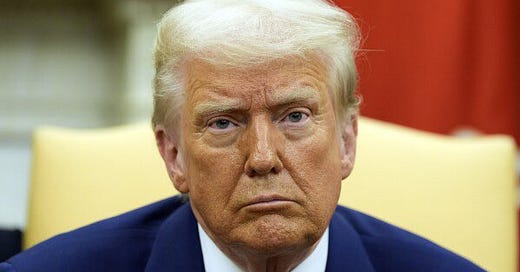




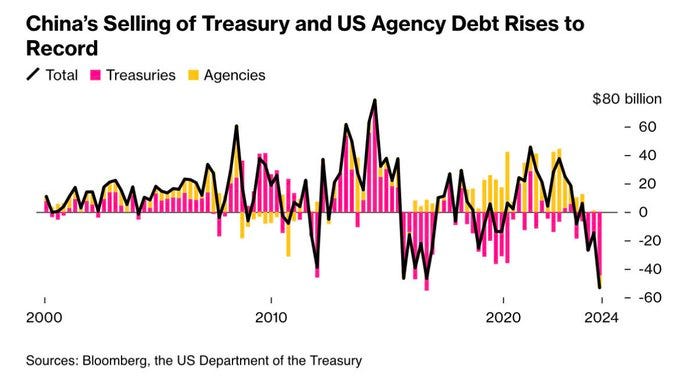
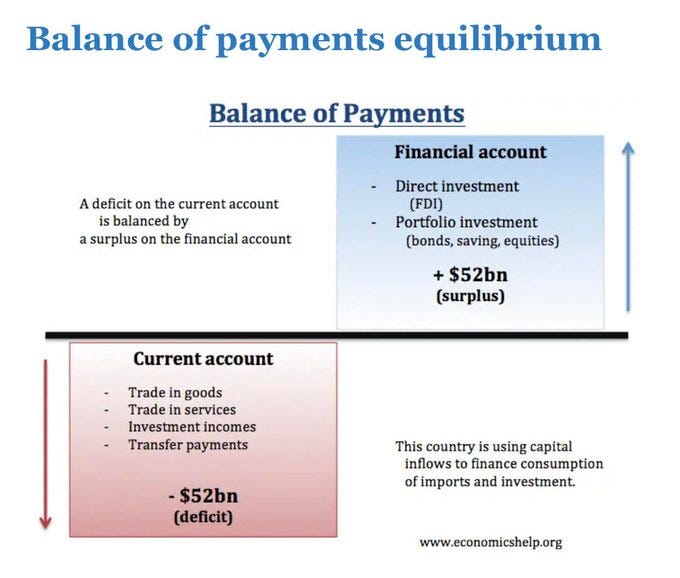
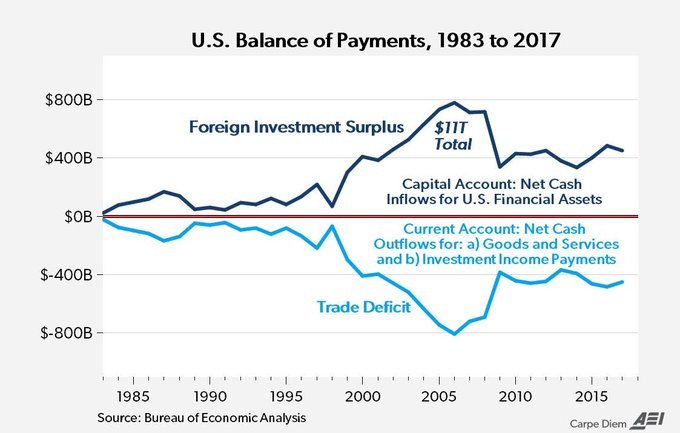

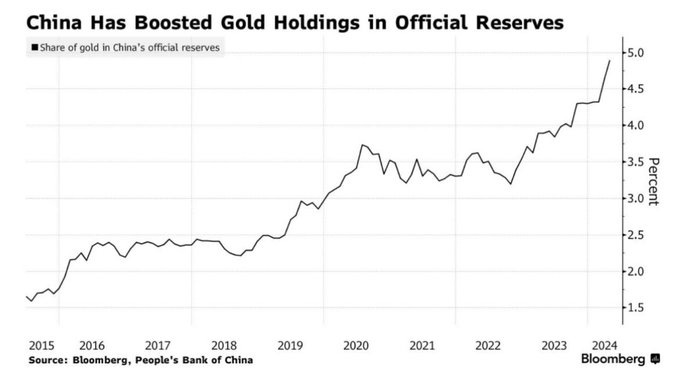
I don’t see meaningful lower interest rates on the horizon.
Tariffs could increase inflation.
China dumping U.S. treasuries could result in a need for higher yields.
The U.S. is going to need to refinance a bunch of short term debt soon due to Janet Yellen decisions.
Interest rates are relatively low, historically speaking.
U.S. government continues to run a huge deficit, creating more borrowing and causing higher treasury rates.
The ultra low interest rates were a historical anomaly that caused a lot of financial damage and inflated a lot of bubbles.
Black Swans - unlikely, but…
- Trump gets the us government spending under control.
- War with Iran causes spike in oil prices
- deregulation causes huge increase in productivity.
- massive movement in manufacturing back to U.S.
- peace Deal with Tisdua ends Russian sanctions
- Peace deal with Iran ends sanctions.
- Israeli peace deal calms middle east.
Noting: It has been reported:
3 U.S. bases in northeastern Syria were closed, including one near the Conoco gas field in Deir ez-Zor. U.S. withdrawal from Syria started with around 600 troops pulling out, bringing total personel numbers down to about 1,400.
Speculation:
Not certain of the US plan but perhaps bolsters the thought that US is over extended and Putin made the right choice with Iran about pulling Asaad out and not fighting.
I still believe Trump has to get out of Ukraine, has to solve the Tariff issue - with a main or primary goal of raising or having enough funds available to complete the Genocide, Ethnic Cleansing, Colonialism, Removal of Palestinians from Palestine or whatever people choose to label it.
I opine this is the reason for everything all at once and at the same time. Urgency.
Perceived Primary Goal - US must raise funds to give Israel to support Israel - do whatever it takes - view that Israel economy collapsing, large debt, loss of: work, tourism, investments, reservists in army not working, etc. Israel cannot afford this war US must pay - no one else will.
I opine, Israel presumed or was prepared for a few months of attack - budget- finance - never planned they would still be neck deep in it and has no money. It appears impossible Israel can afford this and Trump must raise the money somehow.
.
.